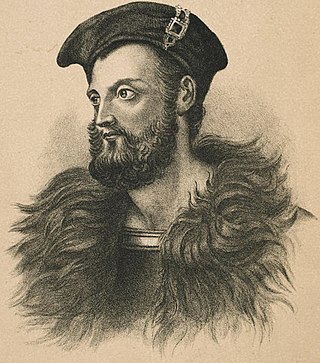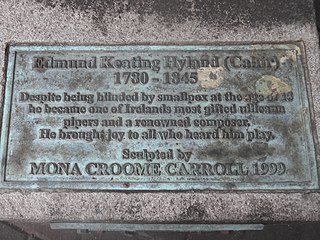
Patrick Sarsfield, 1st Earl of Lucan, born c.1655 – 21 August 1693), was an Irish soldier, and leading figure in the Jacobite army during the 1689 to 1691 Williamite War in Ireland.
Here Northumbria is defined as Northumberland, the northernmost county of England, and County Durham. According to 'World Music: The Rough Guide', "nowhere is the English living tradition more in evidence than the border lands of Northumbria, the one part of England to rival the counties of the west of Ireland for a rich unbroken tradition. The region is particularly noted for its tradition of border ballads, the Northumbrian smallpipes and also a strong fiddle tradition in the region that was already well established in the 1690s. Northumbrian music is characterised by considerable influence from other regions, particularly southern Scotland and other parts of the north of England, as well as Irish immigrants.

Francis O'Neill was an Irish-born American police officer and collector of Irish traditional music. His biographer Nicholas Carolan referred to him as "the greatest individual influence on the evolution of Irish traditional dance music in the twentieth century".
Patrick J. Touhey was a celebrated player of the uilleann pipes. His innovative technique and phrasing, his travels back and forth across America to play on the variety and vaudeville stage, and his recordings made his style influential among Irish-American pipers. He can be seen as the greatest contributor to a distinctive American piping style.

Irish traditional music is a genre of folk music that developed in Ireland.

Garret(t) Barry (Irish: Gearóid de Barra was a blind Irish uilleann piper from Inagh, County Clare, among the most famous players of the 19th century.
William Connolly (1839-1870s/1880s), was a renowned Irish piper in the mid 1800s, in Ireland and The United States.
William Madden, Irish piper.
William Boyle was an Irish piper.
Owen Bohan was an Irish piper.
Nance the Piper is an Irish piper.
John Moore (1834–1894) was an Irish piper.
Pat McDonagh was an Irish piper.
Martin Kenneavy was an Irish piper.
Patrick Flannery was an Irish piper.
John Egan (1840–1897) was an Irish piper.
John "Mac an Asal" McDonough was an Irish piper.
Patrick Walsh was an Irish piper.

"The Lament for Owen Roe" is a traditional Irish ballad dating from the nineteenth century. With a mournful tune, based on an eighteenth-century composition called Lament for Owen Roe O'Neill by the harpist Turlough O'Carolan, it is a lament for the death of Owen Roe O'Neill. Its lyrics were written by Thomas Davis and draw on the tradition of romantic nationalism which was at its height during the era.

Edmund Keating Hyland was an Irish uilleann piper of the early 19th century.





